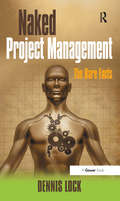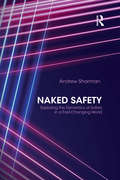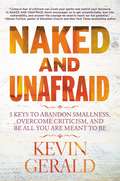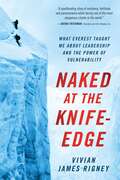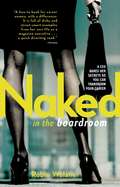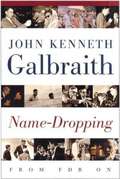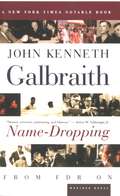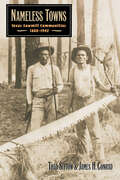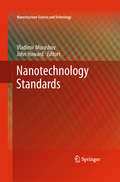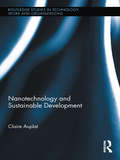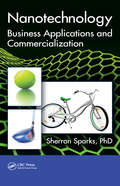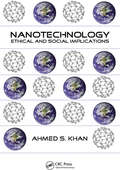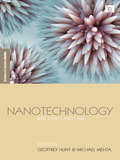- Table View
- List View
Naked Project Management: The Bare Facts
by Dennis LockBooks about project management are plentiful. The best of those books are too comprehensive for the person faced for the first time with managing a small and relatively straightforward project, or for the student studying for a degree or business qualification in which project management is only one of several modules. But, at the other extreme too many of the simpler books treat project management lightly, gloss over or ignore some essential processes, and even get the facts wrong and give incorrect examples. Naked Project Management is an introductory guide to the world of project management from one of the world's most accomplished project management authors. Lock has stripped project management down to its bare facts - simplifying everything but trivializing nothing - leaving sound practical advice on how to organize and manage a small or medium sized project. The book is written in the direct jargon-free style that has become Dennis Lock’s hallmark. Everything is carefully explained and supported with clear diagrams. It covers all the essential aspect of project management in astonishingly few words and provides further instruction with an entertaining case study project that flows logically through the chapters from beginning to end. Degree and other students for whom project management is an elective or small part of their course will love this compact time-saving and reasonably priced study resource.
Naked Safety: Exploring The Dynamics of Safety in a Fast-Changing World
by Andrew SharmanWorkplace safety has never been seen as sexy, clever or cool. Fraught with legislative hurdles, ambiguous policy and complex procedures, despite its alleged importance safety has lost its way. For many organisations safety is seen as burdensome and bureaucratic and has become little more than paperwork and performance charts: things done in fear of persecution – from the authorities, the media or the civil arena – rather than doing the right thing. To change the game and build real risk literacy, it’s vital to make things easier, to strip things back to basics and think again about how we work. This is Naked Safety. Encouraging the reader to step outside their comfort zone, this book demystifies workplace safety, challenging traditional views and catalysing critical thought and high-impact action. With narratives on the central pillars of workplace safety including risk management; legal frameworks; performance; governance; leadership and culture, as well as perspectives on key issues that affect safety – and business – more broadly, such as worker wellbeing; employee engagement; the impact of globalisation; corporate social responsibility; sustainability and the role of the safety practitioner, Naked Safety features over 100 actions to bring about positive, sustainable organisational change. This book is a useful, multi-purpose guide for professionals; an indispensable toolkit for practitioners, business leaders, and anyone with an interest in workplace risk and Occupational Safety and Health. Let’s get Naked!
Naked and Unafraid: 5 Keys to Abandon Smallness, Overcome Criticism, and Be All You Are Meant to Be
by Kevin GeraldCelebrate a vulnerable and open life by overcoming the fear of criticism to start living the life God intended.Fear of criticism has turned into a massive epidemic harder than ever to overcome. It prevents people from speaking up; it's why most people struggle to make decisions; it's why we're uncomfortable with vulnerability and openness; and it's why so many are unable to meet their full potential. But it doesn't have to be that way. Through the Bible story of King David dancing naked in the streets while his distant, guarded, and critical wife watches from a window, Naked and Unafraid provides a visual contrast of these two characters that sheds light on the way we all approach life and explains how the fear of criticism impacts our lives much more than we realize or are willing to admit. God didn't create us to live guarded, isolated lives. Our greatest fulfillment isn't found in the window. It's found in the street. Everything in our lives, including our relationships, our work, our emotional and spiritual health, gets better in a place of openness and vulnerability. But that doesn't mean it's easy. . . because it's not. Vulnerability is risky. Exposure is scary.Naked and Unafraid pushes readers to:Find the courage to not let criticism control or determine who they are and what they do.Stop living in the shallow end of relationships and experience the rewards that true vulnerability can bring.Abandon smallness and live the life they were born to live.Discover how the fear of criticism diminishes in direct proportion to understanding it.Reject the limitations and inhibitions of "window living," so they can experience the freedom and rewards of "street life."Confront their own worst critic that counts them out of what God has included them in.God will help you move away from window watching, and toward street dancing. Know who He says you are, and live in that freedom!
Naked at the Knife-Edge: What Everest Taught Me about Leadership and the Power of Vulnerability
by Vivian James RigneyNaked at The Knife-Edge, Vivian James Rigney&’s compelling and often harrowing true account of summiting Everest, offers a unique window into lessons on leadership and what it takes to succeed in any circumstance.Only a relatively small group of individuals has climbed the highest peak on each of the planet&’s seven continents. Known as the Seven Summits, it is a feat that typically takes years and an enormous amount of planning, training, and effort, in some of the most inaccessible places on earth. But Vivian James Rigney was determined to do just that. An executive coach and globally recognized authority on leadership and teamwork in business, Rigney relied on skills learned in the corporate world in addition to physical training to attempt these summits. Everest, his seventh and final peak, almost broke him. There, he and his team confronted wild storms lasting for days, near-vertical walls of ice, and a knife-edge ridge with fatal drops on either side. They endured avalanches, sub-zero temperatures, and tragedy unfolding around them. The roller coaster of pain, self-reflection, questioning, and above all, loneliness left Rigney with ego in tatters. It was then he discovered an awakening of what real purpose and legacy actually is. This unique and powerful journey reveals critical wisdom for individuals and leaders in any circumstance, including how to: Overcome the ego trap and get out of your head Triage what you can and cannot control Harness your intuition Create shared purpose and real followership Tap into the power of vulnerability and authenticity In Naked at the Knife-Edge, Rigney uniquely combines the hands-on and reflective approach of one of today&’s most respected executive coaches with adventure and a raw and revealing personal story.
Naked in the Boardroom: A CEO Bares Her Secrets So You Can Transform Your Career
by Robin WolanerRenowned media executive Robin Wolaner delivers the 80 Naked Truths businesswomen need to develop presence, seize power, and achieve success. Straight-talking and sensible, Naked in the Boardroom explains how to achieve more: more opportunities, more money, more notches on the corporate belt without sacrificing your integrity or losing your identity. In delicious, bite-sized nuggets, Robin Wolaner's Naked Truths provide universal and instantly gratifying lessons for advancing your career. They can be put into action regardless of your age, experience, industry, or whether you are a one-woman start-up or a big-company employee. Drawing on her own career in magazine publishing and media development, Wolaner shows you how to succeed because of, rather than despite, your unique background and personality. With humor, attitude, and fierce intelligence, she reveals:The keys to successful negotiation on behalf of the company or yourselfWhat great public speakers know and tricks you can useWhen and how to burn your career planHow to do the right thing in the gray zones of business ethicsEffective ways to recover from a mistakeUnusual wisdom for hiring and firing -- and for being hired and firedAnd much morePeppered with candid stories drawn from Wolaner's life, as well as those of other trailblazing women, Naked in the Boardroom is both essential and inspiring. It provides invaluable wisdom for anyone who sees success on the horizon, but who wants help getting there on her own terms.
Nalli Silk Sarees (A)
by V. G. Narayanan Namrata Arora Vidhya MuthuramNalli Silk Sarees Private Limited was a family owned and operated business that retailed Indian ethnic wear. This 83-year old company had enjoyed impressive growth with a $95 million turnover, a 22 store retail footprint, and had outdone its competitors by being the only player in its segment to have a national presence. Headquartered in Chennai, India, the company built its unique national brand by emphasizing innovation, customer centric practices, quality and honesty across the store's retail operations. In 2011, with changing dynamics in the Indian apparel market, the company started to face intense competition from small and large Indian and foreign retailers. The company's chairman, Dr.Nalli Kuppusamy Chetty, announced a $25 million expansion plan and proposed the opening of 12 new stores over a period of two years. This case focuses on the company's pricing strategy, merchandising process and product assortments to support its own competitiveness and overall customer experience.
Name Your Price: Compensation Negotiation at Whole Health Management (A)
by Deepak Malhotra Brian J. Hall Nicole BennettMBA student Monroe Davies is asked by a potential employer to determine his own compensation package. This case follows Jim Hummer, President and CEO of Whole Health Management and Davies through a unique recruitment process that raises questions of compensation and employee incentives, negotiation strategy, and human resources management.
Name Your Price: Compensation Negotiation at Whole Health Management (B)
by Deepak Malhotra Brian J. Hall Nicole BennettSupplements the (A) case.
Name Your Price: Compensation Negotiation at Whole Health Management (C)
by Deepak Malhotra Brian J. Hall Nicole BennettSupplements the (A) and (B) cases.
Name-Dropping: From F.D.R. On
by John Kenneth GalbraithJohn Kenneth Galbraith, the noted economist, joined Franklin Delano Roosevelt and the New Deal in 1934 and served that administration during World War II; in the crucial role of Deputy Head of the Office of Price Administration in charge of price control. His service to FDR and his relationship with Eleanor Roosevelt began a long involvement with the leaders who would define much of the course of the twentieth century: Truman, Stevenson, John F. and Jacqueline Kennedy, Nehru, Lyndon Johnson, and others at home and abroad. Drawing on a lifetime of access to many of the greatest public figures, Galbraith creates a rich and uniquely personal history of the century -- a history he helped to shape. We are invited to hear FDR on the Great Depression and World War II; Albert Speer, the Third Reich's architect and armaments minister, on the boorishness and incompetence of the Nazi leadership; John F. Kennedy, from youth to the presidency; Jacqueline Kennedy's shrewd judgments of the White House inner circle. In this clear-eyed, unsparing, and amusing look back at the world and the people he has known, Galbraith tells what these leaders did -- how they looked to him then and how they look to him now -- with unforgettable reminiscences and a rich infusion of engaging anecdotes. "Name-Dropping" charts the political landscape of the past sixty-five years with the dazzling insight, humor, and literary skill that mark Galbraith as one of the most distinguished writers of our time.
Name-Dropping: From FDR On (Letras De Crítica Ser.)
by John Kenneth Galbraith&“[A] charming memoir [that] serves to remind us that idealism and trust once existed in the White House and Washington, a fact that may seem unbelievable&” (Newsday). A New York Times Notable Book &“Names? You want names? No one knows better ones than John Kenneth Galbraith,&” says the San Diego Union-Tribune. Name-Dropping covers the long and remarkable career of this economist and former ambassador, charting sixty-five years of politics, government, and American history as he writes of the many people he has known—among them Franklin and Eleanor Roosevelt, Harry S. Truman, John F. Kennedy, Adlai Stevenson, and Jawaharlal Nehru—&“with a wit, style, and elegance few can match&” (Library Journal). This &“mischievously and merrily unrepentant&” memoir offers a rich and uniquely personal history of the twentieth century—a history the author himself helped to shape (The Boston Globe). &“Shrewd, irreverent, penetrating, and hilarious.&” —Arthur M. Schlesinger Jr. &“It is not usual for a man past his 90th birthday to write a book that is as fresh and lively as the work of a 30-year-old. But John Kenneth Galbraith is not a usual man, and he has done it.&” —The New York Times
Nameless Towns: Texas Sawmill Communities, 1880–1942
by Thad Sitton James H. ConradA comprehensive history of the sawmill towns of East Texas in the nineteenth and twentieth centuries.Sawmill communities were once the thriving centers of East Texas life. Many sprang up almost overnight in a pine forest clearing, and many disappeared just as quickly after the company “cut out” its last trees. But during their heyday, these company towns made Texas the nation’s third-largest lumber producer and created a colorful way of life that lingers in the memories of the remaining former residents and their children and grandchildren.Drawing on oral history, company records, and other archival sources, Sitton and Conrad recreate the lifeways of the sawmill communities. They describe the companies that ran the mills and the different kinds of jobs involved in logging and milling. They depict the usually rough-hewn towns, with their central mill, unpainted houses, company store, and schools, churches, and community centers. And they characterize the lives of the people, from the hard, awesomely dangerous mill work to the dances, picnics, and other recreations that offered welcome diversions.Winner, T. H. Fehrenbach Award, Texas Historical Commission“After completing the book, I truly understood life in the sawmill communities, intellectually and emotionally. It was very satisfying. Conrad and Sitton write in such a manner to make one feel the hard life, smell the sawdust, and share the danger of the mills. The book is compelling and stimulating.” —Robert L. Schaadt, Director-Archivist, Sam Houston Regional Library and Research Center
Nameless Towns: Texas Sawmill Communities, 1880–1942
by Thad Sitton James H. ConradA comprehensive history of the sawmill towns of East Texas in the nineteenth and twentieth centuries.Sawmill communities were once the thriving centers of East Texas life. Many sprang up almost overnight in a pine forest clearing, and many disappeared just as quickly after the company “cut out” its last trees. But during their heyday, these company towns made Texas the nation’s third-largest lumber producer and created a colorful way of life that lingers in the memories of the remaining former residents and their children and grandchildren.Drawing on oral history, company records, and other archival sources, Sitton and Conrad recreate the lifeways of the sawmill communities. They describe the companies that ran the mills and the different kinds of jobs involved in logging and milling. They depict the usually rough-hewn towns, with their central mill, unpainted houses, company store, and schools, churches, and community centers. And they characterize the lives of the people, from the hard, awesomely dangerous mill work to the dances, picnics, and other recreations that offered welcome diversions.Winner, T. H. Fehrenbach Award, Texas Historical Commission“After completing the book, I truly understood life in the sawmill communities, intellectually and emotionally. It was very satisfying. Conrad and Sitton write in such a manner to make one feel the hard life, smell the sawdust, and share the danger of the mills. The book is compelling and stimulating.” —Robert L. Schaadt, Director-Archivist, Sam Houston Regional Library and Research Center
Naming the Edsel (Condensed)
by Susan Fournier Andrea WojnickiReveals the interesting and unusual story behind Ford's selection of "Edsel" as the new brand name for its ill-fated 1957 new product launch. Noteworthy as perhaps the most extensive, creative, and politically charged naming stories on record. Although both nontraditional approaches to name generation (i.e., correspondence with a popular poet of the time) and more traditional research tools (e.g., consumer surveys exploring top-of-mind brand-name associations and opposites, advertising agency brainstorming) provide input to the naming decision, this is all put aside by the company's chairman of the board, who makes a unilateral decision to use "Edsel" in the final hour. This name choice goes against both consumer research, which suggests problems with the name, and the beliefs of Edsel's sons, who feel that their father may not want his name so utilized, thus revealing the aesthetic quality of the naming decision.
Nanda Home: Preparing for Life After Clocky
by Jill Avery Elie OfekGauri Nanda, the inventor of Clocky, the alarm clock that rolls off the bed stand and forces its owner to find it, has to make critical decisions regarding the future of her nascent company. As sales of Clocky show signs of declining, she must decide whether to continue her focus on the alarm clock category or to branch out into new categories. If the former, the question is which segments to pursue and what features to develop, and, if the latter, the question is whether the concept of "humanizing technology" is something consumers would value in other domains. In addition, Nanda must decide how to continue marketing Clocky and its successors, given the potential for cannibalization. Clocky's success was largely attributable to the media's intense interest and coverage, and it is not clear such attention would carry over to other new product endeavors. Students are presented with a number of new product concepts and the findings from both qualitative and quantitative market research. This allows for a rich discussion of how managers can think creatively about consumer experiences to inform their innovation strategies.
NanoGene Technologies, Inc.
by Michael J. Roberts Linda A. CyrDescribes a company during the start-up phase and focuses on the founders' decisions regarding splitting the equity and compensation. Also considers establishing policies and practices that will set the tone for the company as it grows. Discusses a number of specific action issues including: splitting equity and compensation among the founding team and follow-on employees, designing compensation and hiring practices for the young firm, deciding what the corporate culture should be and how to institutionalize it, and deciding whether to hire a senior-level employee--the first nonfounder employee--at a salary higher than, and equity allocation similar to, the founders.
Nanophotocatalysis and Environmental Applications: Energy Conversion and Chemical Transformations (Environmental Chemistry for a Sustainable World #31)
by Eric Lichtfouse Inamuddin Abdullah M. Asiri Mohd Imran AhamedThis book presents photocatalysis as a state-of-art technology in energy production and conversion. The ever increasing demand for energy with growing economies has led to a dearth of energy sources. The exhaustive dependability on non-renewable resources of energy has not just depleted them but also lead to the birth of secondary problems such as pollution and climate change. The photoactive processes have opened a new window for the production of green energy and helped in environmental sustainability. The harnessing of renewable sources especially sun and water for fuel production and noxious gases reduction solve both the issues of pollution mitigation and energy crisis.
Nanosolar, Inc.
by Alison Berkley Wagonfeld Thomas SteenburghNanosolar is a start-up company in the clean tech sector. It expects to be one of the first manufacturers to produce thin-film solar panels using copper indium gallium (di)selenide (CIGS) technology. Although this technology is less efficient in producing electricity than polysilicone, it is much less costly too. As it is about to enter the market, Nanosolar is facing the decision on which market to enter. Should it attempt to go into the European market which has established feed-in tariffs? Or should it enter the nascent, but growing US market?
Nanotechnology Standards
by John Howard Vladimir MurashovWritten by a team of experts, Nanotechnology Standards provides the first comprehensive, state-of-the-art reviews of nanotechnology standards development, both in the field of standards development and in specific areas of nanotechnology. It also describes global standards-developing processes for nanotechnology, which can be extended to other emerging technologies. For topics related to nanotechnology, the reviews summarize active areas of standards development, supporting knowledge and future directions in easy-to-understand language aimed at a broad technical audience. This unique book is also an excellent resource for up-to-date information on the growing base of knowledge supporting the introduction of nanotechnology standards and applications into the market.
Nanotechnology and Sustainable Development (Routledge Studies in Technology, Work and Organizations)
by Claire AuplatPublic institutions, academic researchers and financial analysts among others hail nanotechnologies as one of the most promising sectors of social and economic development. Calculations predict that it will become a trillion euro industry by 2015 and that it will bring about economic change of at least the same magnitude as the industrial revolution. Nanotechnology is recent, younger by some thirty years than biotechnology, but it appears at a point in time in human history where there is a convergence between the globalization of access to information and increasing awareness of the importance of sustainable development. Nanotechnology and Sustainable Development explores the ways in which this convergence leads to a change in the management of innovation – and ultimately a reshaping of technological democracy. The scope of the study is global, with a particular focus on Europe and the United States, utilizing several case studies of stakeholders including entrepreneurs, commentators, end users, scientists, and policy makers.
Nanotechnology in Green Energy Generation (Emerging Materials and Technologies)
by Ahmed Thabet MohamedNanotechnology in Green Energy Generation provides a comprehensive review of modelling, processing, and applications of all major categories of green energy generation materials. It explores different areas of green energy generation including hydrogen, solar, and wind energies, covering aspects such as synthesis, morphology, materials, and characterization.Presenting the fundamental principles in the design and utilization of green energy generation materials, the book discusses the construction and equivalent circuits of traditional and new green energy cells. In addition, it provides thermal analysis and comparative studies with traditional power generation, including operation and cost-efficiency of new generation cells and modules. The book also includes many case studies, laboratory experiments, and research results throughout the chapters.The book will be a valuable reference for applied researchers, academic researchers and graduate students studying advances in energy engineering, nanotechnology, and materials and composites.
Nanotechnology: Business Applications and Commercialization (Nano and Energy)
by Sherron SparksNo longer the hidden genius of scientists, nanotechnology is now appearing in products manufactured for everyday life—products that can heal, save lives, be more durable, and last longer. It is also attracting the attention of investors interested in participating in this nano revolution. Nanotechnology: Business Applications and Commercialization is a guide for businesses, investors, and research universities who want to bring nanotechnology products to the commercial market. Showing how academia and business can partner to commercialize nanomaterial research, it delineates business aspects for scientists and highlights opportunities for business professionals. Some of the key topics covered include: Questions to ask before writing a business plan Products consumers are currently using Grant and funding options Standardization that will affect domestic and international production Dangers that must be managed to ensure the safety of nanotechnology Commercialization centers and organizations that provide support Barriers to nanotechnology commercialization Competitive factors that can help bring the international economy more stability Areas where nanotechnology is expanding This timely book outlines how to harness nanotechnology innovations through the application of strong business principles, drive the standards and development, and take the knowledge to the commercial level with business applications. Filled with case studies and useful resources, it helps readers bridge the "valley of death"—the gap period in capital financing that exists between research and the market adoption of new technologies.
Nanotechnology: Ethical and Social Implications (Nano and Energy)
by Ahmed S. KhanAdvances in nanotechnology are transforming the ways of creating materials and products, leading society to the threshold of a second industrial revolution. However, future opportunities will depend significantly on how nanotechnology stakeholders deal with the short-term and long-term benefits, limitations, uncertainties and risks of nanotechnolog
Nanotechnology: Risk, Ethics and Law
by Geoffrey Hunt Michael D. MehtaNanotechnology - technology at the molecular level - is held out by many as the Holy Grail for creating a trillion dollar economy and solving problems from curing cancer to reprocessing waste into products and building superfast computers. Yet, as with GMOs, many view nanotech as a high risk genie in a bottle that once uncorked has the potential to cause unpredictable, perhaps irreversible, environmental and public health disasters. With the race to bring products to market, there is pressing need to take stock of the situation and to have a full public debate about this new technological frontier. Including contributions by renowned figures such as Roland Clift, K. Eric Drexler and Arpad Pusztai, this is the first global overview of the state of nanotech and society in Europe, the USA, Japan and Canada, examining the ethics, the environmental and public health risks, and the governance and regulation of this most promising, and potentially most dangerous, of all technologies.
